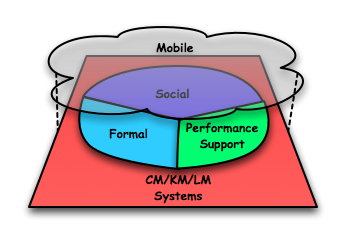We’re about ready to kick up a fair bit of dust! TogetherLearn (Jane, Harold, Jay & I, in various combinations) are serendipitously going to be sending out the social learning and strategy message in a number of ways.
First, on the 21st of April starting at 9AM PT but revolving around the globe for the subsequent 24 hours, Corporate Learning Trends will be hosting a day long circle-the-globe Conversation about Learning in Organizations. Jay is the organizer, and he’s arranged a host of the biggest names in organizational learning to take part. Still needed are hosts and topics in regions around the world for blocks of time. This is free, but we do expect participation. So seize the day, pitch in, and make it happen (or don’t complain when there’s nothing happening in your preferred time slot).
On the 22nd, Harold, Jay, & I are going to be part of the ASTD Pulse of the Profession series of webcasts, talking about Blowing Up the Training Department: Make Learning a Management Priority. Registration is $39.95, but it supports ASTD (we don’t get a dime), and we’ve got a good session planned, with the esteemed Kevin Wheeler serving as our ringmaster/lion tamer. It’s specifically intended for managers, directors, & executives charged with part or all of organizational learning. We intend to talk about the problems that organizations are facing, some of the barriers, and some new ways to think about it.
Then I will be presenting on April 30 (10 AM PT) for Training Magazine Network’s Provocative Ideas webinars, speaking about Why Incrementalism Won’t Cut It Anymore. This presentation is free, but you have to register. I’ll be looking at the bigger picture, not just social/informal, but also content strategy, mobile, and more, and particularly focused on systemic changes and the need to shift, not creep.
I’m sure there’s more I’m forgetting, but that’s enough for now. Hope to see you here and there!
 So I’ve been playing with rethinking my Performance Ecosystem conceptualization and visualization. The original had very discrete components, and an almost linear path, and that doesn’t quite convey the reality of how things are tied together. I believe it’s useful to help people see the components, but it doesn’t capture the goal of an integrated system.
So I’ve been playing with rethinking my Performance Ecosystem conceptualization and visualization. The original had very discrete components, and an almost linear path, and that doesn’t quite convey the reality of how things are tied together. I believe it’s useful to help people see the components, but it doesn’t capture the goal of an integrated system. So here’s my current conception. It took me a long time to create the circle with different components! First I had to discover that there were tools to create freeform shapes, and then work to get them to articulate, but I like the kind of ‘rough’ feel of it (appropriate for it’s stage).
So here’s my current conception. It took me a long time to create the circle with different components! First I had to discover that there were tools to create freeform shapes, and then work to get them to articulate, but I like the kind of ‘rough’ feel of it (appropriate for it’s stage).